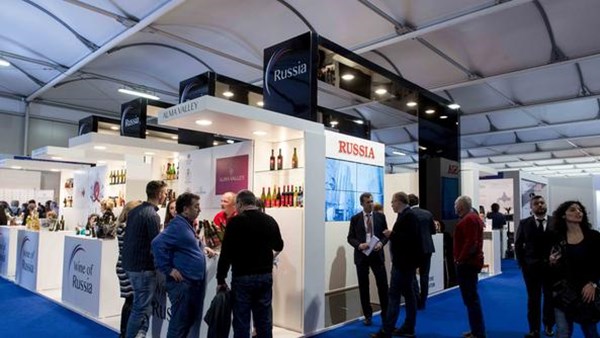Italian police seize Crimean wines presented by Russia at exhibition in Verona
At their stand at the Italian wine exhibition Vinitaly in Verona, Russians were exhibiting wines from the Crimean peninsula which Russia annexed in 2014. This was mentioned by exhibition participant Oleksii Lubetskyi, who is also a manager of the UA2EU project, which promotes Ukrainian exports. Lubetskyi informed the Italian financial police of the violation. After this, the Russians were forced to remove the Crimean wines from their stand. The incident was reported by Lubetskyi on his Facebook page.
“I called carabineers, police, financial police and just security. At the end of the day I visited the Russian stand. The Ukrainian wines had been removed from the stand. This is a victory and the result of the joint action of the public and of state organizations (The Ukrainian embassy in Italy),” Lubetskyi wrote.
Immediately after Lubetskyi, the Ukrainian embassy in Italy approached the Italian law enforcement agencies. Thereafter police confiscated several dozens of bottles of wine of Crimean origin from the Russian exhibition participants. Representatives of the Russian delegation admitted that bottles of wine originating in the Crimea and Sevastopol were taken from their primary stand, but no claims were made against the other wines.
The Russian Ministry of Agriculture said that after the seizure from the stand, about 40 bottles of Crimean wine remained, but all the rest of the products from Crimea spread quickly, because exhibition participants became more interested in tastings.
Yevhen Perelygin, Ukraine’s Ambassador to Italy said that Russia had been warned about the inadmissibility of presenting wines from annexed Crimea at the exhibition in Verona. According to him, the day before the exhibition, the Ukrainian embassy alerted the organizers that the participation of Crimean products under the pretext of being Russian “contradicts the European non-recognition policy for the Crimea and Sevastopol”, and the organizers in turn informed the Russian representatives that the wines from the Crimea which it had mentioned could not be presented at the exhibition.
However, as the ambassador said, before the start of the exhibition it became clear that Russia had simply substituted the originally mentioned Crimean wines for other products of Crimean origin.
“I would say that Ukraine got justice thanks to the politico-diplomatic actions and active stance of our citizens… A third factor is the organizers’ understanding of the situation. They acted within the framework of normal cooperation with the Russian representatives, and informed them that exhibiting this was not permitted. The latter, however, decided to act deceptively, saying ‘Zolotaya Balka is not allowed, so we will exhibit Inkerman’. This behavior led to the organizers acting decisively,” the Ukrainian ambassador explained.
After the incident, Mariana Betsa, spokesperson for the Ukrainian Ministry of Foreign Affairs said that the Foreign Ministry sent a memorandum to Italy and approached the exhibition administration demanding to prohibit the Crimean wines from being displayed in the exhibition.
“According to EU Council Resolution 692/2014, the Italian organizers sent the Russian representatives a request not to exhibit goods from the Autonomous Republic of Crimea in Vinitaly 2017,” Betsa wrote on her Twitter account.
The Russian Ministry of Foreign affairs called the actions of the Italian law enforcement a provocation.
“We view what happened at the annual international wine exhibition in Verona with the seizure of parcels of Russian wines produced in Crimea as provocation, which was inspired in particular by representatives of the Kyiv government in Italy, whose task was apparently to cast a shadow on the official visit of the Italian president to Russia which is currently taking place successfully. It may be that this was their goal,” said the Russian Foreign Ministry representative, Maria Zakharova.
Zakharova was surprised that “the Italian authorities, who are actively advocating the growth of bilateral trade and economic cooperation, were unable to oppose this anti-Russian ploy, this provocation”.
